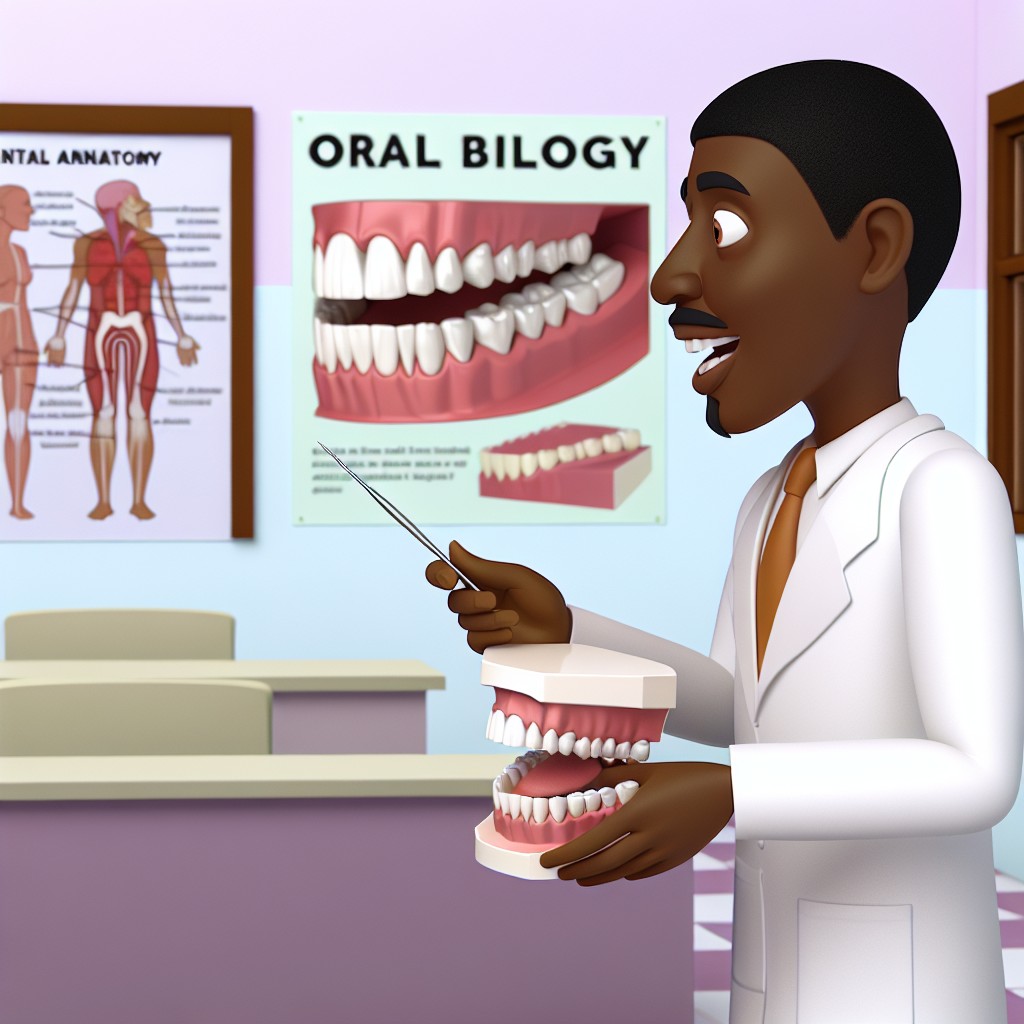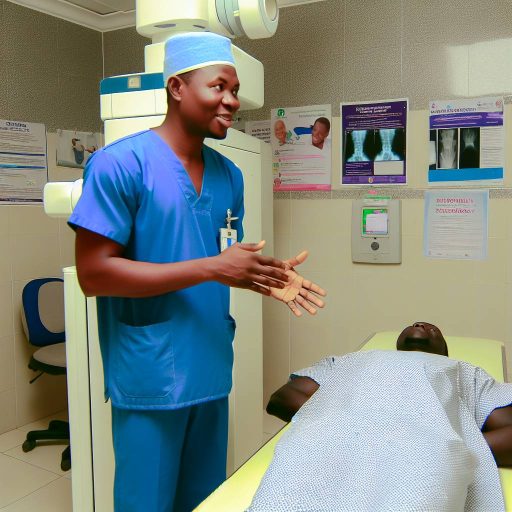Importance of Oral Biology in Dentistry:
Oral biology plays a crucial role in understanding the structure and function of the oral cavity.
Global Incorporation of Oral Biology in Dental Curriculum:
Many dental schools around the world include oral biology courses to provide a solid foundation for students.
Focus on Oral Biology in Nigerian Dentistry Curriculum:
In Nigeria, dental education has also recognized the significance of oral biology in comprehensive patient care.
Historical Perspective:
Dentistry education in Nigeria has evolved over the years, adapting to new trends and standards.
The early days of dentistry education in Nigeria saw limited inclusion of oral biology in the curriculum.
Challenges were faced in integrating oral biology into the curriculum due to limited resources and expertise.
- Challenges were faced in integrating oral biology into the curriculum due to limited resources and expertise.
Current Status of Oral Biology Education:
- Review the current curriculum of dental schools in Nigeria.
- Discuss the specific courses and topics covered in oral biology.
- Analyze the methods of instruction and assessment used in teaching oral biology.
When it comes to the education of future dentists in Nigeria, oral biology plays a crucial role in shaping their knowledge and skills.
Let’s take a closer look at the current status of oral biology education in Nigerian dental schools.
Curriculum of Dental Schools in Nigeria:
Before delving into oral biology specifically, it is important to understand the overall curriculum of dental schools in Nigeria.
The curriculum typically includes a combination of theoretical knowledge and practical skills necessary for dental practice.
Students in Nigerian dental schools are exposed to a wide range of subjects such as anatomy, physiology, biochemistry, pharmacology, pathology, microbiology, and of course, oral biology.
These courses provide a solid foundation for students to understand the complexities of dental health and disease.
Courses and Topics Covered in Oral Biology:
Oral biology is a multidisciplinary field that encompasses various aspects of dental science.
In Nigerian dental schools, students typically cover topics such as the structure and function of oral tissues, tooth development, oral microbiology, and immunology.
Students also learn about oral diseases, oral health promotion, preventive dentistry, and the latest advances in dental research.
This comprehensive curriculum ensures that future dentists have a deep understanding of oral biology and its relevance to clinical practice.
Methods of Instruction and Assessment:
Teaching oral biology in Nigerian dental schools involves a combination of lectures, laboratory work, seminars, and clinical rotations.
These diverse teaching methods aim to provide students with both theoretical knowledge and practical skills.
Assessment methods vary but often include written exams, practical assessments, case studies, and presentations.
These assessments not only test students’ understanding of oral biology concepts but also their ability to apply this knowledge in real-world dental scenarios.
Uncover the Details: Radiography Equipment: What Nigerian Students Should Know
Significance of Oral Biology in Dental Practice:
Understanding oral biology is crucial for dental professionals to diagnose and treat oral health conditions effectively.
Knowledge of oral biology helps in recognizing the underlying causes of dental issues, leading to better treatment outcomes.
Dentists use their understanding of oral biology to perform procedures like tooth extractions, root canals, and dental implants.
By knowing how the oral cavity functions and interacts with the rest of the body, dentists can tailor treatments for individual patients.
Oral biology is essential in preventive dentistry as it guides dentists in educating patients on proper oral hygiene practices.
Dentists rely on oral biology to identify risk factors for oral diseases and develop personalized treatment plans for patients.
Understanding the biological processes in the mouth helps dentists in effectively managing conditions like gum disease and oral infections.
Oral biology also plays a role in cosmetic dentistry, where dentists use their knowledge to enhance the aesthetic appearance of patients’ smiles.
In restorative dentistry, oral biology is crucial for selecting the right materials and techniques to repair and restore damaged teeth.
By incorporating oral biology into their practice, dentists can provide comprehensive care that addresses both the oral and systemic health of patients.
Discover More: Career Opportunities in Medical Laboratory Science
Challenges Faced in Teaching Oral Biology:
- Identifying the barriers to effective teaching of oral biology in Nigerian dental schools.
- Discussing the lack of resources and infrastructure for teaching oral biology.
- Addressing the need for training and development of faculty members in oral biology.
Teaching oral biology in Nigerian dentistry curriculum comes with its own set of challenges that need to be addressed in order to ensure quality education and training for future dental professionals.
Let’s delve into the various obstacles faced when it comes to imparting knowledge in this crucial field:
Identifying Barriers to Effective Teaching of Oral Biology:
One of the major challenges faced in teaching oral biology in Nigerian dental schools is the lack of adequate resources.
This includes a shortage of textbooks, laboratory equipment, and other teaching materials essential for delivering comprehensive education in this subject.
Without access to these resources, students may struggle to grasp complex concepts and practical applications of oral biology.
Furthermore, the limited infrastructure in Nigerian dental schools poses a significant barrier to effective teaching of oral biology.
Insufficient classroom space, outdated facilities, and inadequate technology can hinder the learning experience for both students and faculty members.
Without proper infrastructure, it becomes challenging to conduct hands-on experiments, demonstrations, and interactive sessions that are integral to understanding oral biology concepts.
Transform Your Career with Expert Guidance
Get personalized mentorship consulting that’s tailored to your unique path. Our expert advice is actionable and exclusive.
Get StartedDiscussing the Lack of Resources and Infrastructure for Teaching Oral Biology:
The lack of funding allocated to oral biology departments in Nigerian dental schools contributes to the scarcity of resources and infrastructure available for teaching.
Inadequate financial support restricts the ability to update curriculum materials, invest in modern equipment, and maintain facilities conducive to effective learning.
As a result, students may not receive the quality education they need to excel in this specialized field of dentistry.
Moreover, faculty members in Nigerian dental schools often face a lack of training and professional development opportunities in oral biology.
Without ongoing support and guidance, educators may struggle to stay abreast of the latest research and advancements in this rapidly evolving field.
This can compromise the quality of instruction delivered to students, impacting their ability to develop a strong foundation in oral biology principles and practices.
Addressing the Need for Training and Development of Faculty Members in Oral Biology:
To overcome these challenges, it is essential to prioritize the training and development of faculty members responsible for teaching oral biology in Nigerian dental schools.
Providing educators with access to workshops, seminars, and other professional development opportunities can enhance their knowledge, skills, and teaching methodologies.
By empowering faculty members with the tools and support they need, they can deliver more engaging and effective instruction to students.
This ultimately improves the learning outcomes in oral biology.
In addition, investing in the infrastructure and resources necessary for teaching oral biology is crucial for creating a conducive learning environment.
This includes allocating sufficient funding for textbooks, laboratory equipment, and facility upgrades to ensure that students have access to the tools and materials they need to succeed in their studies.
By enhancing the learning experience through improved resources and facilities, students can better understand complex oral biology concepts.
They can also acquire the practical skills essential for their future careers in dentistry.
Addressing the challenges faced in teaching oral biology in Nigerian dental schools requires a multifaceted approach that encompasses improving resources, infrastructure, and faculty development.
By prioritizing these areas, dental educators can enhance the quality of education provided to students.
This equips them with the knowledge and skills necessary to excel in the field of oral biology and contribute to the advancement of dentistry in Nigeria.
Learn More: Volunteer Opportunities for Dietitians in Nigeria

Strategies for Improvement:
Improving the teaching of oral biology in Nigerian dental schools is crucial for producing competent and skilled dental professionals.
Here are some strategies for enhancing the current curriculum:
- Propose solutions to enhance the teaching of oral biology in Nigerian dental schools.
- Suggest curriculum revisions to better incorporate oral biology.
- Advocate for increased funding and support for oral biology education.
Collaborate with Industry Experts:
Inviting experts from the field of oral biology to conduct workshops and seminars can provide invaluable insights and practical knowledge to both students and faculty members.
This real-world exposure can enhance the learning experience and bridge the gap between academia and industry.
Integrate Technology:
Incorporating digital tools and resources into the curriculum can make the learning process more engaging and effective.
Virtual labs, simulation software, and online modules can help students visualize complex concepts and reinforce their understanding of oral biology principles.
Mentoring Programs:
Establishing mentorship programs where experienced professionals guide and support students can foster a deeper appreciation for oral biology.
These mentorship relationships can provide valuable insights, career advice, and networking opportunities for aspiring dental professionals.
Interdisciplinary Approach:
Promote interdisciplinary collaboration by integrating oral biology concepts with other relevant subjects such as anatomy, microbiology, and pathology.
This holistic approach can help students develop a comprehensive understanding of the role of oral biology in the broader context of dental care.
Continuous Professional Development:
Encourage faculty members to participate in ongoing training and professional development programs to stay updated on the latest research and advances in oral biology.
Faculty development initiatives can enhance teaching methods and ensure that students receive high-quality education.
Curriculum Revision:
Propose revisions to the existing curriculum to allocate more time and resources to the teaching of oral biology.
This may involve restructuring courses, incorporating new modules, or revising assessment methods to prioritize oral biology education.
Industry Partnerships:
Establish partnerships with industry stakeholders, dental associations, and research institutions to facilitate collaborative research projects and experiential learning opportunities for students.
Industry partnerships can provide valuable resources, mentorship, and practical exposure to the field of oral biology.
Advocacy for Funding:
Advocate for increased funding and support for oral biology education at both institutional and governmental levels.
Securing adequate funding can help improve infrastructure, equipment, faculty training, and research opportunities in Nigerian dental schools.
By implementing these strategies and advocating for continuous improvement in the teaching of oral biology, Nigerian dental schools can empower students with the knowledge and skills needed to excel in their profession and make significant contributions to the field of dentistry.
Find Out More: Impact of Nursing Science on Public Health
Importance of Oral Biology in Dentistry
The blog post highlighted the significance of oral biology in Nigerian dentistry curriculum.
Oral biology plays a crucial role in understanding oral health and disease prevention.
It is evident that incorporating oral biology into dental education enhances clinical practice.
Continued efforts should be made to strengthen oral biology education in dental schools in Nigeria.
Dental students must develop a solid foundation in oral biology to improve patient care.
Emphasizing oral biology will ultimately contribute to better oral health outcomes in Nigeria.
Oral biology should be a fundamental component of dental curriculum in Nigeria.




